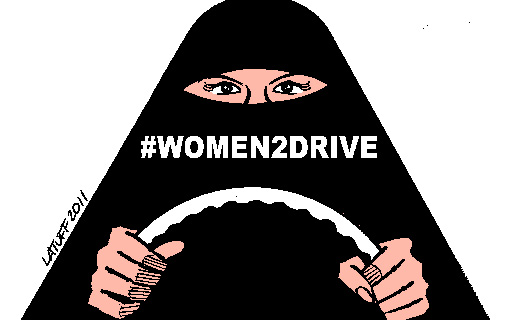
On this date 25 years ago, on Nov. 6, 1990, 47 women in Riyadh, the Saudi Arabian capital, drove their cars in a 14-car convoy to protest the driving ban. They were called “whores” and “prostitutes,” imprisoned overnightalong with their male supporters, had their passports confiscated, and some lost their jobs. The next day their names, addresses and phone numbers were published and readers were told, “Do what you believe is appropriate regarding these women.” Death threats and social stigmatization followed promptly.
According to scholar David Commins, “In 1957, Riyadh pronounced a ban on women driving.” Saudi Arabia is unique in being the only country in the world where women are forbidden to drive any kind of motor vehicle on public roads. Nor can they take taxis on their own. On buses women are obliged to sit separately from men. Since 1990 several further driving protests have occurred, but the unwritten “law of convention” has still not changed.
Some who have written about it hypothesize that in 1990, as the First Gulf War was gearing up, Saudis were exposed to female American military driving jeeps in the country, inspiring Saudi women to question their own “gender apartheid.”
In 2007, Wajeha al-Huwaider and other women petitioned King Abdullah for women’s right to drive, and a film of al-Huwaider driving on International Women’s Day 2008 attracted international media attention.
In 2011, the Arab Spring motivatedwomen, including al-Huwaider and Manal al-Sharif, to organize a more intensive driving campaign, and about 70 cases of women driving were documented that June.Al-Sharif described the action as acting within women’s rights, and “not protesting.” In late September, Shaima Jastania was sentenced to 10 lashes for driving in Jeddah, although the sentence was later overturned.
Another woman from Jeddah, Najla Hariri, started driving in May 2011, stating,”Before in Saudi, you never heard about protests. [But] after what has happened in the Middle East, we started to accept a group of people going outside and saying what they want in a loud voice, and this has had an impact on me.”
Maha al-Qahtani was given a ticket for driving without a Saudi Arabian licence. She was pleased to receive the ticket, stating to a Time magazine journalist traveling with her, “It’s a ticket. Write this down. I am the first Saudi woman to get a traffic ticket.”
In July 2011, Princess al-Taweel, niece-in-law of King Abdullah, spoke about her opposition to the driving ban on the U.S.National Public Radio, and called for women to have equal rights in the workforce, in the legal system, and in education. She described these human rights as more important than the right to drive. In response to criticisms of women’s rights campaigns, she described her approach as “evolution not revolution.”
In early December, a member of the Consultative Assembly, Kamal Subhi, submitted a report to the Assembly saying that lifting the ban would cause prostitution, pornography, homosexuality, divorce and the “end of virginity.”
In 2002, The Economist magazine estimated that the salaries of the approximately 500,000 (male) chauffeurs driving women in Saudi Arabia came to 1percent of the national income.
By the year 2012 there were upward of 100 Saudi women who had driven regularly since June 2011, often without incident, but unlicensed and unpublicized.
In 2013 another campaign to defy the ban targeted October 26th as the date for women to start driving. Sheikh Saleh al-Lohaidan, one of Saudi Arabia’s top clerics, said women who drive risk damaging their ovaries and bearing children with clinical problems. Interior Ministry employees warned leaders of the campaign not to drive on that date, and in the Saudi capital police road blocks were set up to check for women drivers.
However, despite this discouragement and a heavy police presence, by the next day Saudi activists had posted 12 films on YouTube said to be of women driving the day before, and reported that other women had also driven but without recording their exploits on video or in photographs.A YouTube film made by a male Saudi comedian went viral to support the women’s driving campaign, parodying the Bob Marley song “No Woman No Cry” as “No Woman No Drive.”
Although various acts of international solidarity with the Saudi women have been documented, Western nations have shown profound reluctance to engage the Saudi leaders on their policies toward women, as well as on their harsh punishment, including the death penalty, for commonly respected rights in much of the world, such as basic freedom of speech.
American politicians have saved their sense of outrage over “human rights” for much weaker states, such as Cuba, Venezuela, and Honduras. U.S. and other Western investment in the Saudi economy – and significant Saudi investment in the West as well – are determining factors in the U.S. timidity in criticizing the Saudis.
There’s also a lot of oil in Saudi Arabia to which U.S. policy has been committed to preserve access for the better part of the last century.
American journalist Rosemarye Levine lived in Saudi Arabia during the time of the 1990 driving demonstration and later wrote about it. See here. Another account can be readhere.
Adapted from the above sources and Wikipedia.
Photo: Cartoon for Saudi Arabia’s Women to drive Movement by Carlos Latuff. | Wikipedia (CC)












Comments